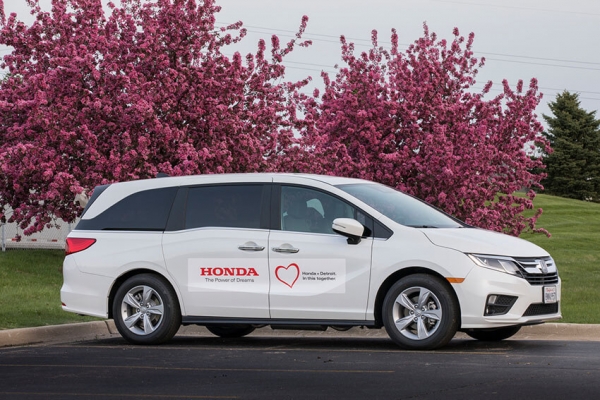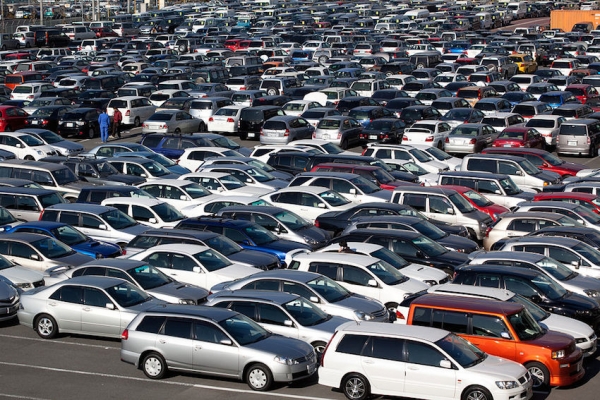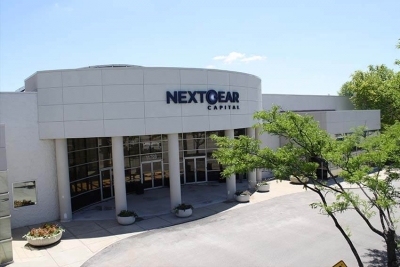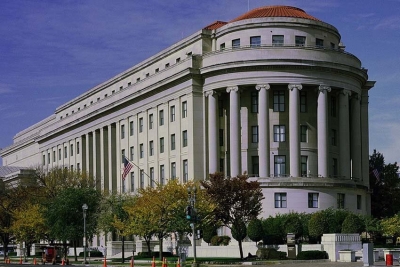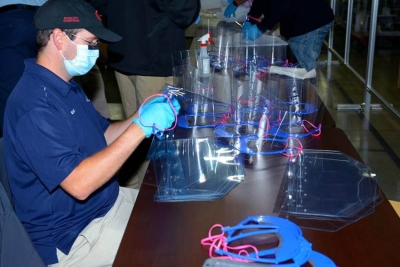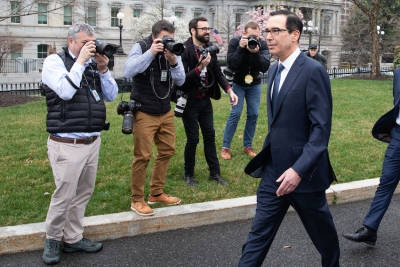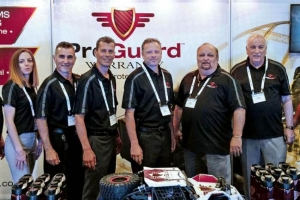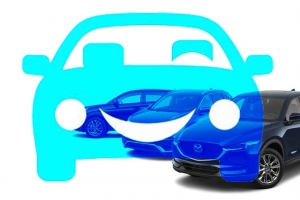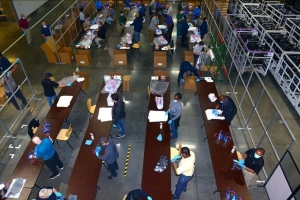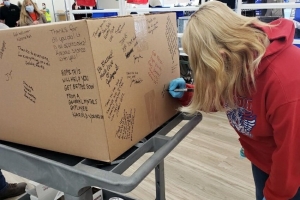

CoVid-19 Industry Updates (191)
Hondas Transport Health Workers
Honda recently delivered to the city of Detroit 10 Odyssey minivans that have been specially outfitted to transport people potentially infected with COVID-19, as well as healthcare workers. To protect the health of the driver from the potential for droplet infection during transportation, the Honda Odysseys have been retrofitted with a plastic barrier installed behind the front seating area, as well as modifications to the ventilation system to maintain an air pressure differential between the front and rear seating areas.
After seeing news reports about similar specially equipped vehicles modified by Honda in Japan, officials from the state of Michigan and Detroit approached Honda in the U.S. in mid-April about the possibility of acquiring similar vehicles for use in transporting local residents and healthcare workers to COVID-19 testing. A team of volunteers at Honda’s R&D center in Raymond, Ohio, including senior engineers and fabrication experts, quickly conceived and designed a method to modify the U.S. Odyssey at the Honda R&D Americas vehicle development center in Raymond, Ohio, where it was originally developed.
“As of today, the city of Detroit has tested over 20,000 residents and employees for COVID-19. Transportation is a critical component of ensuring every Detroiter has access to a test. We are very appreciative of Honda for choosing Detroit to deploy these newly modified vehicles,” said Detroit Mayor Mike Duggan.
Manheim Offers Limited Access
As states lift restrictions, Manheim will begin to allow limited access to its property, in accordance with enhanced safety measures outlined by Center for Disease Control guidelines.
Manheim President Grace Huang made the announcement in a statement on May 1.
“Starting next week, select Manheim locations will begin providing access for clients to preview inventory on a limited basis,” Huang wrote. “These locations are aligned with relevant local and state ordinances to ensure our clients have a safe experience on our lots. Upon entry, clients can expect to comply with certain protocols to ensure their health and safety. It is our hope that, we will be able to offer this access at other locations as local and state ordinances allow.”
She added “as always, the health and safety of our team members, clients and communities remains our top priority.”
Under these updates, limited preview periods will be available during specific days and times on non-sale days only. Should clients plan to preview inventory, strict safety and compliance measures will be in place. However, auction offices and facilities will remain closed.
Manheim will maintain Simulcast-only sales at its locations, where local and state directives allow. All digital channels and tools remain fully operational. Simulcast selling will continue to be handled by Manheim’s Remote-Seller tool.
The company will continue to allow vehicle pick-up and drop off at our auction locations as local and state directives allow.
As Manheim continues to update its operations, further COVID-19-related developments could alter its plans, Huang stated.
“Should this occur, we will adapt accordingly and communicate any changes to our employees, clients and partners,” she wrote.
Manheim will continue to offer support to dealers by: waiving Simulcast buyer and seller success fees; extending through May the waiver of Manheim Express sell fees for all self-listed vehicles; waiving seller fees for vehicles sold without a title or Title Absent and temporarily changing the arbitration policy by not allowing arbitration on a TA vehicle.
“As a team, we will continue to monitor industry conditions and stay close to our clients to understand their short and long-term business challenges and opportunities. Manheim remains committed to our industry and our client’s success and appreciate their continued partnership during these extraordinary times,” stated Huang.
Floor Planner Offers Relief
As part of its ongoing response to the COVID-19 pandemic, NextGear Capital announced it will continue to support dealers by extending its initial dealer relief program.
NextGear is continuing to defer curtailment and extension payments for eligible floorplan advances – for all NextGear Capital dealers in good standing – through May 31, 2020. Within the first 30 days of NextGear Capital’s original relief package, NextGear Capital deferred more than 160,000 payments, providing assistance to more than16,000 dealers when it was needed most.
“After discussions with our dealers, we decided to continue the relief terms that were the most important, beneficial and meaningful to them and their businesses,” said Scott Maybee, president of NextGear Capital. “Our hope is that, between the relief package, our incredible staff and the resources we’ve put together online, we can help our dealers make it out on the other side of this unprecedented economic crisis.”
FTC Postpones Safeguards Workshop
The Federal Trade Commission announced that it has postponed its workshop seeking input on proposed changes to the Safeguards Rule under the Gramm-Leach-Bliley Act until July 13. The event will be held online.
The virtual workshop, originally scheduled to take place May 13, will continue to focus on some of the issues raised in response to amendments the FTC has proposed making to the Safeguards Rule, which requires financial institutions to develop, implement, and maintain a comprehensive information security program. In 2019, the FTC sought comments on the proposed amendments to the Safeguards Rule.
The FTC has extended the deadline to submit a comment on the topics that will be examined at the workshop until August 12, 2020. Instructions for filing comments can be found in the Federal Register notice, which will be published soon. Those interested in participating as a panelist at the workshop can email the FTC at This email address is being protected from spambots. You need JavaScript enabled to view it. by May 14. The workshop will be webcast on the FTC’s website.
Kia Brings Masks to Georgia
In response to a shortage of personal protective equipment (PPE) caused by the pandemic, Kia Motors has delivered an initial supply of 15,000 face shields to the Georgia Emergency Management Agency.
“Kia Motors Manufacturing Georgia asked how they could help, and then stepped up to provide life-saving equipment for the heroes on the front lines in the battle against COVID-19,” said Georgia Department of Economic Development Commissioner, Pat Wilson. “We thank Kia once again for being such a strong partner in our Georgia-made family.”
Face shields are being assembled by paid volunteers from KMMG, which has implemented a series of safety measures to protect team members, including facial temperature scans, providing face masks and gloves, and staggering workstations. Kia will gradually increase its face-shield production, ultimately reaching a capacity of 200,000 units per month, in support of donations the company has scheduled over the next several weeks to medical facilities in Southern California and New York. Face-shield production is the latest extension of Kia's Accelerate the Good.
Trump Signs New Relief Package into Law
President Trump signed a $484 billion relief package for small businesses on April 24, which includes $320 billion for the depleted Paycheck Protection Program.
Trump said it will keep millions of American workers on the payroll.
“It’s great for small business, great for the workers,” Trump said during the signing of the bill.
The package follows the previous CARES Act funding of PPP. The earlier program was flooded with requests for loans and ran out within days of its availability.
The new package also includes $59 billion for the Economic Injury Disaster Loan (EDIL) program which provides loans to small businesses and farms.
Independent dealers from across the country have been receiving the PPP loans under the first relief package and more will be expected to apply now that new funding is approved.
National Independent Automobile Dealers Association CEO Steve Jordan said the new law is a necessary step for dealers across the nation struggling to keep their businesses afloat until the economy gets back to full speed.
“The funding from these loans is vital to keep these tens of thousands of small businesses viable so they can provide needed transportation to their customers,” Jordan said, “and just as important, so they can continue to provide jobs and income to their employees through this crisis.”
U.S. Treasury Secretary Steven T. Mnuchin and Jovita Carranza of the U.S. Small Business Administration issued a joint statement after the bill was signed.
“The PPP has supported more than 1.66 million small businesses and protected over 30 million jobs for hardworking Americans,” they stated. “With the additional funds appropriated by Congress, tens of millions of additional workers will benefit from this critical relief.
“We encourage all approved lenders to process loan applications previously submitted by eligible borrowers and disburse funds expeditiously. All eligible borrowers who need these funds should work with an approved lender to apply. Borrowers should carefully review PPP regulations and guidance and the certifications required to obtain a loan.”
Alliance Offers Video Solution
ProGuard Warranty has formed a professional alliance with SnapCell Inc. to bring their innovative automotive personal video solution to ProGuard’s base of independent and franchise dealers across the United States. ProGuard Warranty plans to introduce SnapCell’s simple to use, online video capabilities for automotive sales, service and business development centers through a discounted rate that allows dealerships to keep their digital doors open while maintaining social distancing.
The SnapCell technology enables the automotive sales process to be facilitated with virtual digital retailing. Live video streaming can be used for face-to-face contact with the customer and they can even take the customer on a virtual test drive to replicate the dealer experience. The functionality extends to the service lane side of the operation where technicians can use video to explain the repairs recommended for the customer’s vehicle, expediting approvals and opening more bays.
ProGuard had been in product testing mode for over a year when the COVID-19 crisis hit.
“While we didn’t foresee a nationwide shutdown, we were already in talks with SnapCell as a solution dealers could use to adapt to the changed shopping experience,” said Dominic Limongelli, president, ProGuard Warranty. “We’ve found that collaborating with companies in other channels is a great way to add value and better serve our clients.
Edmunds Offers Discount
Edmunds is extending through the end of May the 50 percent discount that it provided to its dealer partners in April. Subscription services for dealer partners will remain active and fully supported by Edmunds’ sales teams.
“Edmunds is doing everything it can to support our dealer partners as our industry continues to navigate through this crisis,” said Avi Steinlauf, Edmunds’ chief executive officer.
Edmunds has also launched a completely redesigned Industry Center page, where dealers can find all of Edmunds’ free digital product offerings and solutions that will help them better navigate the challenges of the current selling environment. These include inventory badges on the Edmunds website for stores that offer home delivery or have custom hours, and Edmunds’ Digital Retailing solution, which lives on the Edmunds website and enhances remote sales by driving car shoppers who have already built their deals online directly to dealers.
Kia Makes Face Shields
Kia Motors announced that production of face shields has begun at its manufacturing plant in West Point, Ga. Initial donations of medical use face shields assembled at Kia Motors Manufacturing Georgia (KMMG) will be made in Georgia, Alabama, New York and California.
With a monthly capacity of 200,000 units, the face shields are being assembled by paid volunteers from KMMG, which has implemented a series of safety measures to protect team members, including: conducting temperature scans, providing face masks and gloves, and staggering workstations. Materials are being sourced from vendors such as 3-Dimensional Services Group, a Michigan-based rapid response manufacturer supporting prototype and low volume production applications.
GM's First Ventilators Ship
On April 16th the first Ventec Ventilators were shipped out of GM’s plant in Kokomo, Indiana and the workers that built them wrote notes and signed the boxes with messages of hope and support for frontline hospital workers and people suffering from COVID-19.
GM began working with Ventec, a small Seattle-based producer of the ventilators, in early March and mobilized more than 1,000 employees and nearly 100 auto suppliers to start making the critical machines in the fight against COVID-19. The goal is to eventually make 10,000 ventilators per month, according to GM and Ventec, but the companies didn’t specify how long it would take to reach that output. GM also plans to produce masks.
With 960,000 US COVID-19 patients potentially needing ventilators, President Trump ordered General Motors on March 27th through a 1950’s wartime act to make ventilators for U.S. hospitals treating COVID-19 patients. GM said it began work on the life-saving machines on March 16th.
More...
Mazda Helps Healthcare Workers
Mazda North American Operations (MNAO) announced it will provide free standard oil changes and enhanced cleaning services for U.S. healthcare workers at participating dealers nationwide. This program, which began on April 16, is not limited to Mazda owners and is available for most makes and models from other manufacturers. The Essential Car Care program, developed in partnership with the Mazda dealer network, will invest a minimum of $5 million as part of the initiative.
“Supporting the communities where we live and work is rooted deeply in Mazda’s 100-year history. We are honored to give back to those dedicated to saving lives during this pandemic,” MNAO President Jeff Guyton said.”
Firm Petitions State
Dealer XT, an auto dealer compliance firm, has created a petition to urge California Gov. Gavin Newsom to declare auto dealers as essential businesses.
In the online petition, Dealer XT asked Newsom to “expressly add” auto dealerships to the list of the essential businesses. It said the state’s position only lists auto repair and supply businesses as essential and is unclear and conflicts with other local government lists.
The petition states, “Automobile dealers are currently experiencing confusion about whether they can remain open as an ‘essential business’ as it relates to automobile sales. As an example, the Counties of Sacramento and Merced have specifically listed automobile dealer sales as ‘Essential Businesses’ while other counties have not. Some counties have now amended their orders to allow cars sales with certain restrictions.”
The petition shares stories of healthcare workers who, for various reason, were left without transportation because they could not buy a car. It also explains that most dealerships have small staffs and are able to social distance and protect customers. The petition adds, “Over the past few weeks, simple solutions have successfully been applied by many essential businesses across the state to provide a safe environment. Why not allow car dealerships to do the same?”
Fed: Industrial Production Falls
Total industrial production fell 5.4 percent in March, as the COVID-19 pandemic led many factories to suspend operations late in the month.
Manufacturing output fell 6.3 percent; most major industries posted decreases, with the largest decline registered by motor vehicles and parts. Total industrial production for manufacturing saw its largest declines since January 1946 and February 1946, respectively. The indexes for utilities and mining declined 3.9 percent and 2.0 percent, respectively. At 103.7 percent of its 2012 average, the level of total industrial production in March was 5.5 percent lower than a year earlier. Capacity utilization for the industrial sector decreased 4.3 percentage points to 72.7 percent in March, a rate that is 7.1 percentage points below its long-run (1972–2019) average.
The weakness in consumer durables was led by a drop of 27.2 percent in automotive products, while the decline for consumer energy products reflected decreases in both fuels and utilities. The production of business equipment decreased 8.6 percent, held down by a drop of 22.8 percent in transit equipment that reflected cutbacks in the output of both motor vehicles and civilian aircraft.
Manufacturing output dropped 6.3 percent in March and at an annual rate of 7.1 percent in the first quarter. In March, the index for durable manufacturing fell 9.1 percent; the most sizable decline among its components was in motor vehicles and parts, where output fell 28.0 percent.
Hyundai Offers Grants for Tests
Hyundai Motor America announced the expansion of its support for COVID-19 drive-thru testing to 22 hospitals nationwide with $4 million in grants through its Hyundai Hope On Wheels program. These grants are designed to combat the coronavirus by providing increased access to testing throughout the nation.
The company also announced an in-kind donation of 65,000 COVID-19 RT-PCR tests developed by Seegene, a South Korea-based global leader in multiplex molecular diagnostics.
“As a global automaker, we continue to monitor the COVID-19 situation and its potential harm to the U.S. and beyond,” said Jose Muñoz, president and CEO of Hyundai Motor North America. “A best practice that was crucial in South Korea’s handling of the coronavirus was drive-thru testing. This approach protects the healthcare workers and patients from the potential spread of the virus, while diagnosing those most in need.”
Hyundai and its over 825 dealers have also provided support to local institutions with financial assistance, food donations, face-mask headband production and loaned vehicles.



